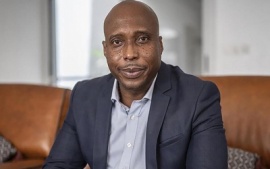
DAKAR, 6 September (IRIN) - A record number of illegal migrants reached the shores of the Spanish Canary Islands last weekend. Authorities reported that between Saturday and Sunday, 1,400 migrants, mainly from West Africa, arrived in eight canoe-style fishing boats that they believe left from Mauritania.
 The longer and riskier maritime route to the Canaries became increasingly popular this year after the shorter route through Morocco was cut off by increased patrols. Another route from North Africa into Sicily was stymied by Italian navy patrols.
The longer and riskier maritime route to the Canaries became increasingly popular this year after the shorter route through Morocco was cut off by increased patrols. Another route from North Africa into Sicily was stymied by Italian navy patrols.
The journey from Senegal to the Canaries is approximately 1,500 km and can take anywhere from five to 20 days. Upon arrival, dehydrated and exhausted, those who have made the crossing face the possibility of repatriation to their respective countries.
Yet despite the risks, many young West Africans, frustrated by the limited opportunities at home and tempted by the stories of those who have made it, borrow from friends and family to pay for their passage.
The sandy alleys of Yarakh, an old fishing quarter in Dakar, are dotted with modest houses of varying styles. In front of the homes, women tend to small businesses and unemployed youths loiter about. With the waters depleted of fish, few young Senegalese consider following in the footsteps of their fathers as fishermen.
They do, however, look to the sea.
This is the first of a series of three profiles of Senegalese migrants.
GALASS LETTE, 26
Galass Lette had heard the stories. The risk, he decided, was worth it. In Tenerife, they told him, there was plenty of work and banana fields as far as the eye can see. If not on the fields, then perhaps he could get a job on one of the many construction sites. In Spain, he was told, there is work to be had.
If he could get a job, he thought, he could help his mother with money. Then, he thought, he could go beyond the Canary Islands, onward to more opportunity, to the United States.
"When your mother's means are very limited, and she is supporting children who barely knew their deceased father, it begins to weigh heavily on you, especially when you are the eldest," he says. "Without any assurance of work there is nothing left to do. And I've always wanted to go to the United States, and barring that, Europe, to make my life there," he said.
Word eventually reached Galass that some men were organising a boat trip for the Canary Islands. Galass lacked the means to pay the fare but his family got together to help him. An aunt had put aside nearly US $2,000.
"It was enough to send three of us," he said.
Galass, his younger brother and cousin paid traffickers for a place on a boat to the Canary Islands. In preparation, Galass said the traffickers consulted a clairvoyant to ensure a safe trip.
"Everyone departing does this to see if the conditions for the voyage will be favourable. But what we didn't do was consult the internet to really understand what the conditions would be like," he said.
Although the voyage was rough, Galass and his companions made it. But the journey ended there.
"The Spanish police were sympathetic towards us," he said. "They said that they would prefer it if we Senegalese stayed and worked to help them catch up economically, the way Italy did using illegal migrants. They advised us that the minute we got out, to just work and not get involved in anything shady. They told us that we were qualified professionals and could succeed here," he said.
 Galass was among the first 99 Senegalese to be repatriated this year. He and the others were put on a plane that they believed was bound for Madrid or Malaga, but that landed in Dakar instead.
Galass was among the first 99 Senegalese to be repatriated this year. He and the others were put on a plane that they believed was bound for Madrid or Malaga, but that landed in Dakar instead.
"We started to realise that the flight was too long, and that the Spanish might have tricked us, which turned out to be the case," he said.
Galass said the migrants heckled Senegalese authorities when they arrived. "I don't trust them anymore, especially since all their promises meant nothing. The minister of National Solidarity promised us money but the hoops you had to jump through to see the money discouraged us," he said.
Although Galass failed in his journey, his brother and an uncle eventually succeeded and now live in Barcelona. "They have already sent home their first shipment of money so that we can pray for them and make offerings to bless their stay," he said.
Galass works in Dakar making deliveries for a local business but is paid daily and some days there is no work. Otherwise, an uncle gives him a bit of work at a sugar processing company.
"I don't think about becoming a fisherman," he said. "If that was an option, you wouldn't have all these boat owners going over to Spain."
Galass says he is prepared to make the journey again, even though his cousin died attempting the trip.
"How else can I help my family? And what about my aunt who paid for my trip? Nothing can hold me back," he said. "I'm just waiting for the next departure."
sab/kdd/cs/ss

































0 Commentaires
Participer à la Discussion